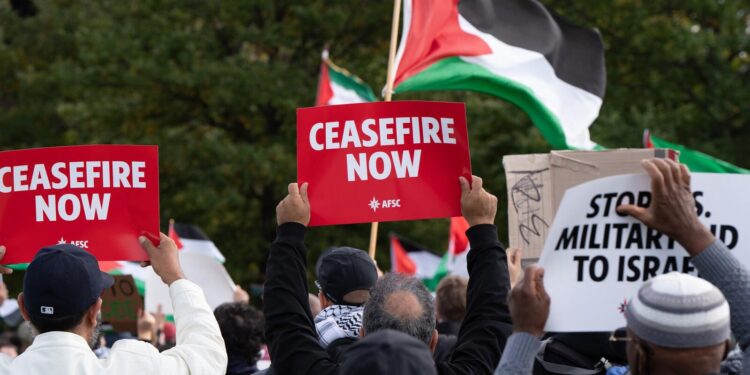In a pivotal moment for regional stability, Türkiye’s Foreign Minister Hakan Fidan has underscored the critical importance of a cease-fire in the ongoing negotiations between Türkiye, Russia, and Ukraine. As tensions continue to escalate in Ukraine, Fidan’s comments signal a renewed effort to foster dialogue and find common ground amidst the conflict. The talks, which aim to address pressing humanitarian concerns and pave the way for a sustainable peace, highlight Türkiye’s central role as a mediator in this complex geopolitical landscape. With the eyes of the international community focused on the outcome, the call for a cease-fire emerges as a fundamental step towards ending hostilities and achieving a lasting resolution.
Cease-fire Proposal at the Heart of Türkiye-Russia-Ukraine Negotiations
The recent discussions between Türkiye, Russia, and Ukraine have increasingly centered around a cease-fire proposal that aims to put an end to the prolonged conflict in the region. This strategic initiative comes amid growing international calls for peace and stability, highlighting the urgency of diplomatic resolutions. Officials from all three nations have expressed cautious optimism, indicating that a mutually acceptable cease-fire could serve as a foundation for broader negotiations. Key points being discussed include:
- Immediate cessation of hostilities: A halt to military actions to facilitate humanitarian assistance.
- Exchange of prisoners: A potential agreement on the exchange of captured soldiers.
- Safe zones: Establishing protected areas for civilians affected by the conflict.
Moreover, the feasibility of the cease-fire is deemed essential for fostering trust among the parties involved. Observers suggest that implementing a temporary truce can pave the way for long-term negotiations related to territorial disputes and autonomy issues. The proposed framework also emphasizes enhancing economic cooperation and reassessing military strategies to prevent future escalations. A recent table outlines key stakeholders and their positions:
| Stakeholder | Position |
|---|---|
| Türkiye | Mediator, advocating for peace |
| Russia | Seeking recognition of annexed territories |
| Ukraine | Demanding restoration of territorial integrity |
Implications of a Cease-fire for Regional Stability and Global Security
The recent discussions surrounding a cease-fire in the Türkiye-Russia-Ukraine talks bring forth significant implications for both regional stability and global security. A successful cessation of hostilities could create a ripple effect, fostering an environment conducive to diplomatic resolutions and peace-building efforts. By halting the violence, key stakeholders may reclaim the opportunity to engage in constructive dialogue, addressing underlying grievances and potential flashpoints that have exacerbated tensions. This proactive approach could lessen the likelihood of further escalations, reinforcing stability across the region. Key benefits of a cease-fire include:
- Reduction in civilian casualties: A cease-fire can dramatically lower the immediate threat to innocent lives caught in conflict.
- Humanitarian aid access: It opens avenues for humanitarian organizations to deliver essential assistance to affected populations.
- Political momentum: A stable environment can catalyze peace talks, inviting broader international engagement and support.
Furthermore, the implications extend beyond regional dynamics, potentially influencing global security frameworks. An effective cease-fire could serve as a model for conflict resolution strategies worldwide, impacting how international alliances respond to similar crises. Enhanced stability in the Black Sea region may also mitigate concerns surrounding energy security and trade routes, vital to European economies. Furthermore, countries involved in the negotiations might bolster their diplomatic standings, positioning themselves as key mediators in global conflicts. A summary of potential global impacts includes:
| Global Impact | Description |
|---|---|
| Increased Diplomatic Engagement | Facilitates more active participation of global powers in conflict resolution. |
| Stability in Energy Markets | A reduction in conflict-related disruptions aids economic predictability. |
| Enhanced Multilateral Cooperation | Encourages countries to work together in addressing shared security concerns. |
Strategic Recommendations for Lasting Peace in the Türkiye-Russia-Ukraine Talks
In the pursuit of a sustainable resolution to the ongoing conflicts involving Türkiye, Russia, and Ukraine, several strategic recommendations emerge as crucial for effective dialogue and negotiations. Primarily, the establishment of a comprehensive cease-fire remains essential, serving as a fundamental building block toward reducing hostilities and fostering an environment conducive to peace talks. This cease-fire should not only focus on halting immediate combat operations but also encompass provisions for humanitarian access and the protection of civilians in conflict zones, laying the groundwork for trust-building among the involved parties.
Additionally, it is vital to implement inclusive dialogue mechanisms that engage a diverse range of stakeholders, including civil society representatives, to ensure that the voices of those most affected by the conflict are considered. A successful peace process should also prioritize the following elements:
- Monitoring and verification: Establish independent bodies to oversee cease-fire compliance.
- Economic cooperation: Promote joint economic projects to foster interdependence.
- Long-term strategy: Develop a roadmap for sustained peace, including political dialogue and conflict resolution frameworks.
To Conclude
In conclusion, the emphasis on a cease-fire as a vital component for achieving lasting peace in the ongoing Türkiye-Russia-Ukraine talks underscores the complexities of the conflict. As highlighted by Turkish Foreign Minister Hakan Fidan, a mutual commitment to halting hostilities is foundational to fostering dialogue and finding solutions to the multifaceted challenges facing the region. The diplomatic efforts underway not only seek to alleviate immediate tensions but also aim to pave the way for a broader resolution that addresses the underlying issues at play. As negotiations continue, the international community watches closely, hopeful that this pivotal moment can lead to a sustainable path toward peace. The stakes are high, and the prospect of cooperation among Türkiye, Russia, and Ukraine remains crucial for stability in Eastern Europe.














